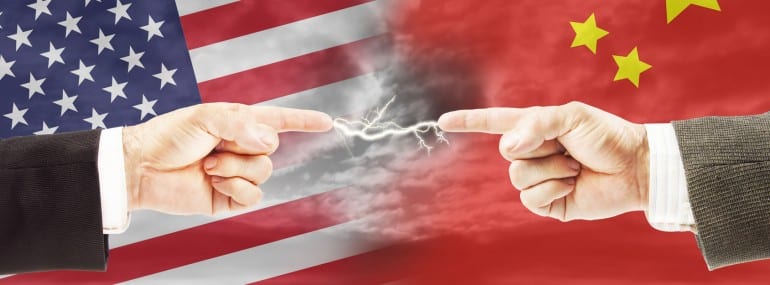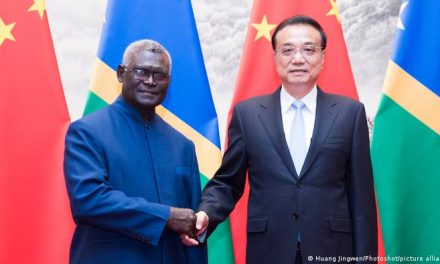By Deng Yuwen
Five Chinese state-owned enterprises will voluntarily delist from the New
York Stock Exchange, in what is seen as a sign that the U.S. and Chinese
economies are heading for decoupling. Although it is not news that more
Chinese companies are withdrawing from the US stock market, that these
five, including PetroChina, did so at the time of the Chinese naval exercises
during and after Nancy Pelosi’s visit to Taiwan was judged by the market abrupt, since the previous attitude of the Chinese side gave the impression that the country’s companies were very reluctant to withdraw from the US market, and would not do so unless they were delisted by the US.
The market has different interpretations about the reasons for the five enterprises, including PetroChina, voluntarily delisting, but not wanting to be “humiliated” is probably the decisive factor. Since the United States enacted the “Foreign Company Accountability Act” in 2020, Chinese companies listed in the United States are required to hand over audit reports. Private companies that do not deal with sensitive industries and data will probably cooperate with the United States to hand over the results of these audits. However, for state-owned enterprises, especially central-government ones, this requirement is extremely difficult to satisfy, even if the latter’s request is not particularly aimed at China nor maliciously motivated. Because the Chinese government wants these central enterprises to carry out some major tasks on its behalf, any audit reports would contain a great deal of sensitive information that in the judgment of the Chinese government is best kept confidential. Of the five state-owned enterprises delisted in this case, four are central (as opposed to provincial or local) enterprises, including two oil companies and an aluminum and an insurance company, each of which falls within the domain of what the Chinese government sees as strategic industries, a category that includes financial firms. Of course, the Chinese Communist Party sees these companies’ confidential information should not become known to the US, because no one can guarantee that U.S. securities regulators will not leak such confidential information to the country’s intelligence and security agencies. Even if they keep the information confidential, these U.S. securities authorities will at any moment of confrontation between the United States and China still serve the interests of the United States, and the information will be made use of. In other words, Chinese state-owned enterprises listed in the United States cannot meet both the requirements of the United States and Chinese governments. Therefore, rather than being forced to delist by the US regulatory authorities, it is better to take the initiative to delist on their own and retain a bit of “face.” Since the market value of these five state-owned enterprises in the United States is not large compared to that in other markets in which they are listed, their American delisting will not immediately damage them much financially.
The listing of Chinese companies in the United States once symbolized the close economic integration between the two countries. Chinese companies have obtained high-quality financing through US capital markets, and American investors have obtained dividends from China’s economic growth via these same companies. The first batch of Chinese companies listed in the United States can be traced back to roughly 2000, these initially all being tech companies. Currently, there are more than 220 Chinese companies listed in the United States, making China the foreign country with the most companies listed there. Most of these are Internet companies, but there are also some state-owned enterprises, including national-level ones. Although most of the Internet companies are not state-owned, their activities are related to big data, and a few of them, e.g. Alibaba and DiDi, have very large market capitalizations.
Does the “voluntary” delisting of these five state-owned enterprises in the US market indicate that China no longer needs this capital market and is thus prepared to broadly decouple from the US? On the surface, it might seem so. In the past 20 years China’s capital market has grown, although this growth has almost completely coincided with the listing of Chinese companies in the United States. In addition, on the surface China’s capital market is structurally close to mature. There are not only the two now-major markets of Shanghai and Shenzhen, but also the Growth Enterprise Market (GEM), a market affiliated with the primary Shenzhen market but designed for new, potentially high-growth companies. Last year, the Beijing Stock Exchange established its Science and Technology Innovation index, which can also meet the listing and financing needs of different types of new companies. If we also consider that China by world standards has a high savings rate, from the perspective of corporate financing it would seem that the US capital market is not critical. Therefore, even if the more than 220 Chinese companies were to be delisted from the US, the impact would still be bearable.
However, beyond simply raising funds, Chinese companies have in the past had other reasons to want to go public in the United States, sometimes (bot only sometimes) triggering defensive changes in Chinese market rules. As the most mature capital market in the world, the US stock market has advantages lacking in the Chinese and even the Hong Kong stock markets. First, the US market is very liquid, which is attractive to many companies. Second, the threshold for listing is low, and even companies still losing money are allowed to go public. Both the mainland Chinese and Hong Kong stock markets in contrast require countries seeking to be listed to already be profitable. To list on the submarket for A shares, the combined profit in the most recent three years should already be 30 million Renminbi, and on the GEM exchange the figure is 10 million. In contrast, on the American NASDAQ exchange, while there are also profit requirements, they can be traded off against other alternative requirements involving revenue or asset value. Many young companies, especially in tech, burn through a great deal of money in the early stages. If they are required to make profits, they cannot go public at all on China’s primary exchanges. The newer Science and Technology Innovation market does not require profit requirements, but it is still considerably smaller.
Third, overseas a listing in which same shares have unequal voting rights is allowed. The founders of startup companies everywhere worry that they will lose control after the company goes public. Even though the company might raise a lot of funds through its initial public offering, if the founders lose control after that its motivation for innovation may decline, which is not good for the long-term development of the company and early investment in it. It is also very disadvantageous for investors who want to share in the benefits of the long-term development of the company. Issuing stock with different rights, allowing the founders of the business to have a controlling stake for a period of time, solves this problem, and is common in the US tech industry. China’s Alibaba initially intended to list in Hong Kong, but Hong Kong regulators were unwilling to change the rules specifically for it, so it listed in the U.S. instead. This incident also triggered reflection by the Hong Kong stock market, and now companies that list in Hong Kong are allowed to have different voting rights for shares otherwise the same.
Fourth, even as the threshold for listing in the US securities market is low, it also has a superior regulatory system. For example, if companies engage in financial fraud, investors can sue individually or collectively. This incentivizes Chinese companies listed in the United States, especially technology companies, to improve their corporate governance. Finally, companies listed in the United States can for the aforementioned reasons combined improve their international reputation.
It can be said that the US capital market has brought not just funds but this series of institutional norms to Chinese companies. This is of course beneficial to China’s overall economic development. Many companies, technology companies again in particular, have achieved rapid growth after they have been listed in the United States, leading to their improved reputation today in the industry. Some economists have admitted that before 2018, if many Chinese technology companies had not been listed in the United States, they would probably have been unable to go public to begin with, so the development of China’s digital economy would have been significantly handicapped. This argument is eminently reasonable.
In reality, with respect to financing, although China’s savings rate is high, in an example of the Chinese government’s substantial control over finance, it uses its administrative power to directly or indirectly interfere with financial institutions such as banks, forcing them to lend these funds to large state-owned enterprises that implement the government’s will or large private enterprises that comply with the government’s industrial policy. Private enterprises, especially small and medium-sized firms, in general still face tremendous problems of “financing difficulties more broadly and high costs in particular,” and so overseas financial markets, including the United States, are still an important financing channel for Chinese enterprises.
Although the current total market value of shares traded in the US of these five state-owned enterprises is not high, the total market value of all “China concept stocks,” a term for overseas securities of Chinese companies whose business is conducted mostly in China, is still roughly 1.7 trillion US dollars. As of the end of July, 159 public and private Chinese companies, including the tech giant Alibaba, were included in the US government’s “pre-delisting list.” These accounted for 70% of all listed China-concept stocks. If these 159 companies are all delisted, 1.2 trillion US dollars in market value will disappear. Although these companies will still be listed in China and Hong Kong, this market value cannot be fully recovered, and more importantly, the companies will lose the financing channel of the US capital market. For the United States, pensions and mutual funds will have no opportunity to buy and hold shares of Chinese companies, especially dynamic technology companies, and these funds’ returns may decrease. Pensions and mutual funds are a major store of wealth for the middle class in the US. The stock market is the main way these funds gain income, and delisting will indirectly reduce the wealth of US investors. In addition, American stock exchanges themselves will also lose a lot of business. But these losses in the United States will not be obviously and directly felt by ordinary people.
Without question, the five state-owned enterprises took the initiative to delist from the United States, which indicates that the pace of delisting by Chinese enterprises is accelerating. The above analysis shows that its losses to China from this decoupling are far greater than the losses to the United States, especially considering the political effects. Public opinion on the delisting of Chinese enterprises is more focused on the economic perspective, but it also needs to be viewed from a political perspective, i.e. acknowledging that a link between the interests of China and the United States has been lost. Such a linkage of economic interests is different from noneconomic, people-to-people exchanges. Although there are emotional and ideological considerations in the latter sort of exchanges, the former are more the result of rational calculation, and rational calculation mainly considers interests, here national interests. The reason why Chinese officials first freed and then even encouraged Chinese companies to go public in the United States is that the main consideration in the early stages for such companies is to use the US capital market to obtain the funds that companies need, namely US dollars. There are two ways for China to obtain U.S. dollars. One is through trade, and the other is through listing of companies in the United States. Although the former is predominant, the latter is also necessary. In the early and middle stages of their development, many countries lack enough U.S. dollars. Especially for a very large economy like China, the U.S. dollar has played an important role in the country’s economic development for a long time. Enabling the use of dollars to purchase the raw materials, resources, key technical equipment and even the talent needed for national development is why China runs a large trade surplus. In this regard, economic considerations are political considerations, and the two are inextricably interlinked.
In addition to the need to possess large holdings of dollars, through the listing of companies in the United States China also wants to form a community of interests with and throughout Wall Street, both Wall Street elites and the broad US middle class. When Chinese companies go public in the United States, most of the listings are handled by U.S. investment banks. These banks thus establish close ties with Chinese officials behind not just state-owned but private companies as well. Thus, if needed at a critical time, these groups who now have strong interests involving China will help lobby on its behalf. Second, this building of common interests is also established through the purchase of shares in Chinese companies by American investors. As mentioned earlier, pensions and mutual funds there are the main channels for the middle class in the United States to obtain capital gains. In their purchasing decisions, perhaps indirect, middle-class individuals will also buy China-concept stocks, especially those of high-tech companies. Although this confluence of interests is not as sizable, direct and obvious as in the case of Wall Street, it may also influence the attitude of the American middle class towards China. If Chinese companies are forced to withdraw from the U.S. market due to the deterioration of relations between the two countries, this base of support will also be cut off. Without the political protection provided by mutual interest, China will be in a more disadvantageous position in any confrontation with the United States.
Adding the delisting of the five state-owned enterprises to the recent series of economic actions against China by the United States will make this clearer. Not long ago the US Congress and President Biden agreed to the so-called chips bill, an attempt to promote the competitive strength of computer-chip manufacturing in the US. Biden is cultivating an international alliance to prevent the sale to China of machinery that enables the production of the most advanced computer chips. The Biden administration made it clear that it wants to compete with China in high technology and capital markets. Complete decoupling of Western economies from China may be impossible to achieve, but decoupling in key technologies and fields has nearly the same destructive effect as complete decoupling. China will be unable to use the technology, equipment and capital markets of the United States to promote its own economic development and technological progress, which means that the domestic globalization it has known in the past will disappear. Instead it will have to live in a sort of semi-globalization devoid of American and perhaps overall Western technology. In the past 40 years, although China has also learned a good deal about how to develop and has achieved some success in that regard, e.g. in the industrialization of its military, without continuing to benefit from broad globalization no one can say whether China can successfully replicate this model of military industrialization on a larger scale. Only time will tell.
This article first appeared in Yibao Chinese on 08/24/2022
























